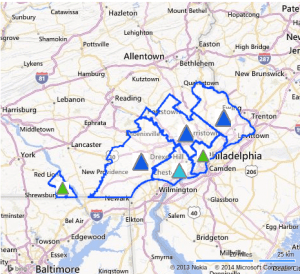Back during Hurricane Sandy, the Philly-area electric utility PECO tried everyone’s patience by over-promising and under-delivering when it came to getting everyone’s lights back on. “Within three days,” PECO said, then four days came and went and people were still sitting in the dark.

I’m hoping PECO learned from that. I’m hoping they’ve come to understand that it’s always much better business-wise to under-promise and then over-deliver. I’ll find out by tomorrow night at 11 p.m., which is when they’ve assured us we’ll have our lights — and, more importantly, our heat — turned back on. That’d be nice, because if it turns out PECO has learned to under-promise and over-deliver, then my heat might be back before late Friday night.
Most of my town is still out, but my brother-in-law’s neighborhood has power and so does one of the area McDonald’s (and so does BooMan, apparently, lucky neighbor). So my wife, daughter and dog are all staying at her brother’s place (my wife’s brother, not the dog’s) and I’m warming up at Mickey D’s before heading to the Big Box to restock all the generators, gas cans, chainsaws and rocksalt they’ve been selling this week.
The free WiFi here gave me a chance to check out the comment thread on the previous post, which reminded me of Thursdays long-ago with some of the theist/atheist discussion. It didn’t read like one of the old Thursday flame-wars, though, so much as a friendly conversation between veterans of those old battles.
I’m not sure I’d seen PZ Myers’ “An Atheists Creed” before. I reject it, of course, ’cause I’m a Baptist and rejecting creeds is kind of our thing. We’re anti-creedal (mostly — though, of course, we don’t make a creed out of being so). But apart from that intrinsic Baptist aversion to all creeds, I find a lot to like in Myers’ credo.
That creed — and much of the rest of that discussion — reminded me of something Richard Beck wrote almost exactly a year ago.
Again, I dislike creeds, but if I were asked to recite or affirm Beck’s post, I’d probably agree to stand and do so:
A common move in Christian a/theism is to collapse the transcendent into the immanent. That is, the vertical dimension where humans reach toward heaven and God is collapsed into the horizontal dimension where we reach toward other human beings. In a sense, the two dimensions become conflated, an identity relationship is formed. To love God is to love your neighbor. With no remainder. Those are the same thing.
I’m very happy with this move. … When push comes to shove if you ask me what loving God means I’ll respond with “loving your neighbor.” In fact, I’d go on to argue that when the two become decoupled — when loving God is pursued independently of loving your neighbor — we create the ingredients for the most toxic aspect of religion: loving God against your neighbor.
All that to say, Christian a/theism recommends something very much along these lines. The collapse of the transcendent dimension is a sort of “death of God” move that allows us, in the wake of this collapse, to find God immanently, in the brokenness of our human relationships.
And again, I’m comfortable with this move. Though I don’t tend to read the collapse of the transcendent as a “death of God” move as much as a theologia crucis or Girardian move. That is, in the cross God divinizes the victim, calling us to stand in solidarity with the victim to instantiate the Kingdom of God. The cry of dereliction on the cross is less metaphysical than sociological. The issue isn’t that God is dead as much as it is about where God is socially located (i.e., among the god-forsaken and cursed — the victims of the earth).
… The point being that the Christian a/theists are right. As long as it exists the vertical dimension is always going to be a temptation and the source of the most toxic manifestations of religion. And if that is so, perhaps it is best, or just safer, to jettison the whole thing. Do the “death of God” a/theism thing and collapse the transcendent.
… Engagement with the transcendent is, for the reasons noted above, probably more likely to lead you away from the needs of others. You start becoming religious and pious and spiritual and self-righteous.
If that sounds like something you’d be scared to say out loud in your church, keep in mind that it’s also pretty much a summary of 1 John in slightly fancier words.
OK, then, there’s something else to chew over here until PECO comes through and/or the next time I find some WiFi access.












